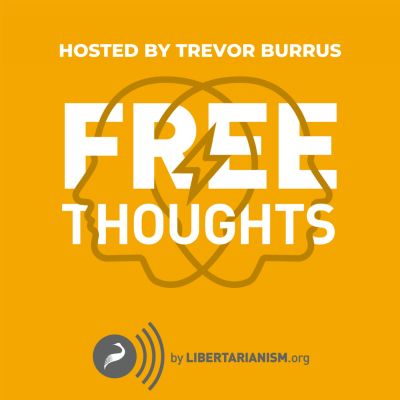A weekly show about politics and liberty, featuring conversations with top scholars, philosophers, historians, economists, and public policy experts. Hosted by Trevor Burrus. Hosted on Acast. See acast.com/privacy for more information.
https://www.libertarianism.org/podcasts/free-thoughts
Gesamtlänge aller Episoden: 17 days 4 hours 46 minutes
The Libertarian Moment?
Is this a libertarian moment? Was there a libertarian moment? Can we expect there to be a libertarian moment? Yes to all three, says Reason managing editor Katherine Mangu-Ward. We also discuss whether younger people are becoming more libertarian, why libertarianism always seems to be associated with the political right, and whether libertarianism depends on technological growth...
War Is the Health of the State
This week we’re joined by Christopher A. Preble, vice president for defense and foreign policy studies at the Cato Institute. We ask whether there exists a single libertarian foreign policy that all libertarians would agree with; talk about the idea that war powers, resolutions, and laws passed during wartime don’t recede in times of peace; give a quick rundown of American military history; and discuss the rise of a permanent private industry supplying the military...
Lysander Spooner's Letter to Grover Cleveland
This week Matt Zwolinski joins us to talk about the fascinating life of one of the most radical libertarians of the nineteenth century: the lawyer, abolitionist, political philosopher, and entrepreneur Lysander Spooner, who believed adamantly that we have no obligation to do what the government tells us to do just because the government is telling us to do something.
Near the end of his life Spooner wrote a letter to then-president Grover Cleveland...
Why Do Intellectuals Oppose Capitalism?
Robert Nozick, in his essay “Why Do Intellectuals Oppose Capitalism?” proposed that many highly-educated public intellectuals tend to lean towards collectivism and authoritarianism because they expect society to work best in the way that schools and the academic system (which is the system they are most familiar with) operates...
A Better Choice: Healthcare Solutions for America
Where did the health insurance system as we know it come from? Why are so many people these days getting insurance through their jobs? Why are prices so particularly high in American health care? Is Obamacare working?
John C. Goodman notes that what’s critical to understanding the American health care system is that the identity of the party that ends up paying the bill has a huge effect on pricing in the medical marketplace...
Going for Broke: Deficits, Debt, and the Entitlement Crisis
With the Greek debt crisis in the news, everyone is asking “Are we the next Greece?” Is our current level of debt sustainable? How about our entitlement programs, like Social Security, Medicare, and Medicaid?
Michael D. Tanner joins us fresh from the release of his latest book, Going for Broke: Deficits, Debt, and the Entitlement Crisis (2015). Together we discuss whether or not the American government’s profligate spending can be reined in in time...
When Is Voluntary Choice Really Voluntary?
This week Michael C. Munger joins us to talk about voluntary transactions and questions of justice in market pricing.
What would everyone agree is truly voluntary? Are disparities in bargaining power coercive? What’s wrong with using the state to address these disparities? What about price gouging situations? What about sweatshops?
Show Notes and Further Reading
Dr. Munger’s 2010 paper “Euvoluntary or Not, Exchange is Just”.
Dr...
What Does It Mean to Think Philosophically?
Philosophy is concerned with three basic questions: “What is there?,” “How do I know about it?,” and “What do I do about it?” The three questions correspond to the fields of metaphysics, epistemology, and ethics.
Our Cato colleague Matthew Feeney joins us this week to talk about philosophy, rhetoric, why people disagree about politics, performative morality, the non-aggression axiom, and more...
How Much Should Philosophy Influence Public Policy?
This week Andrew I. Cohen discusses his new book, Philosophy, Ethics, and Public Policy: An Introduction. We talk about philosophy as a careful, methodical approach to thinking about issues.
Is philosophy particularly powerful compared to other academic and scientific disciplines? What counts as public policy and how does philosophy influence it? Is it a good idea to “politicize” philosophy?
Hosted on Acast. See acast...
Rationalism, Pluralism, and Freedom
This week Jacob T. Levy joins us to discuss his new book, Rationalism, Pluralism and Freedom (2015)...
